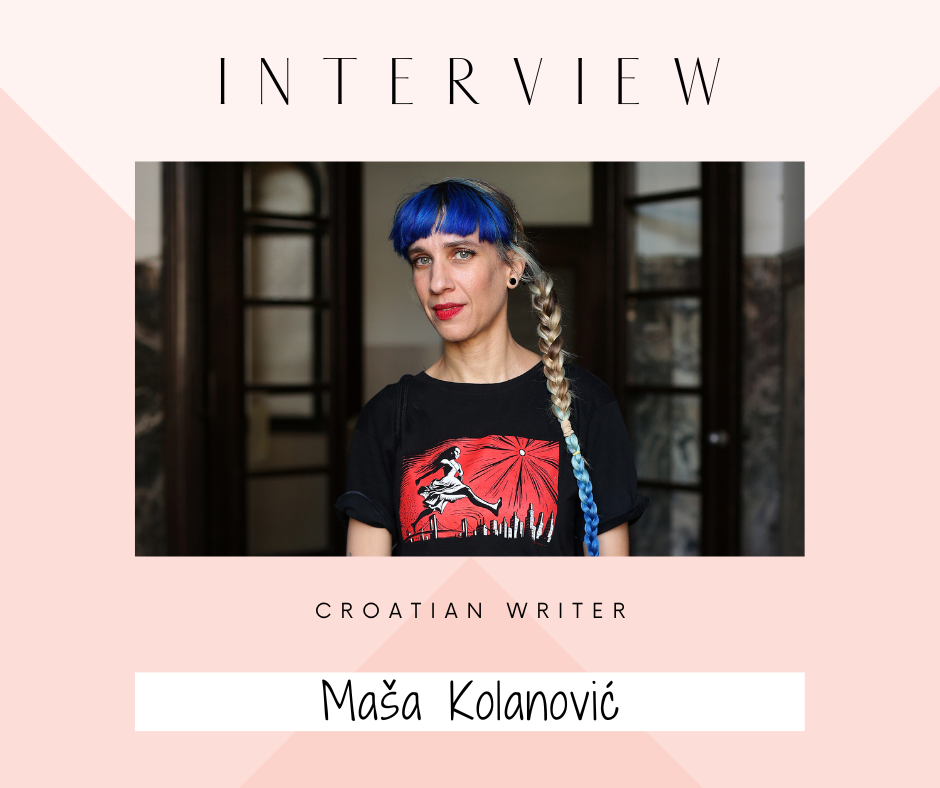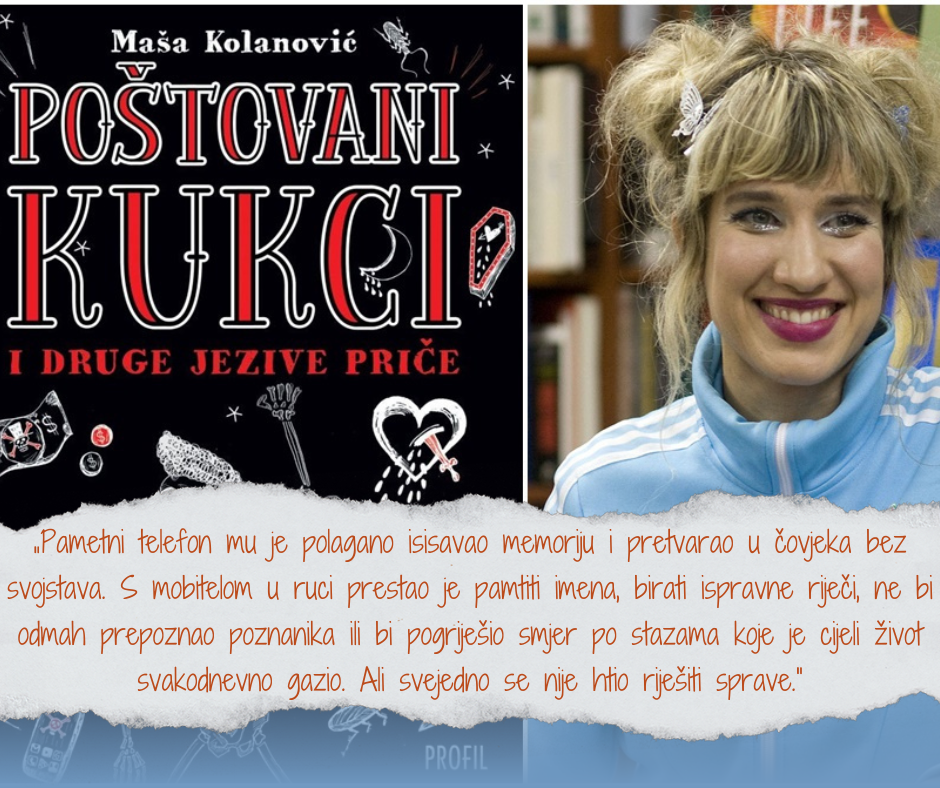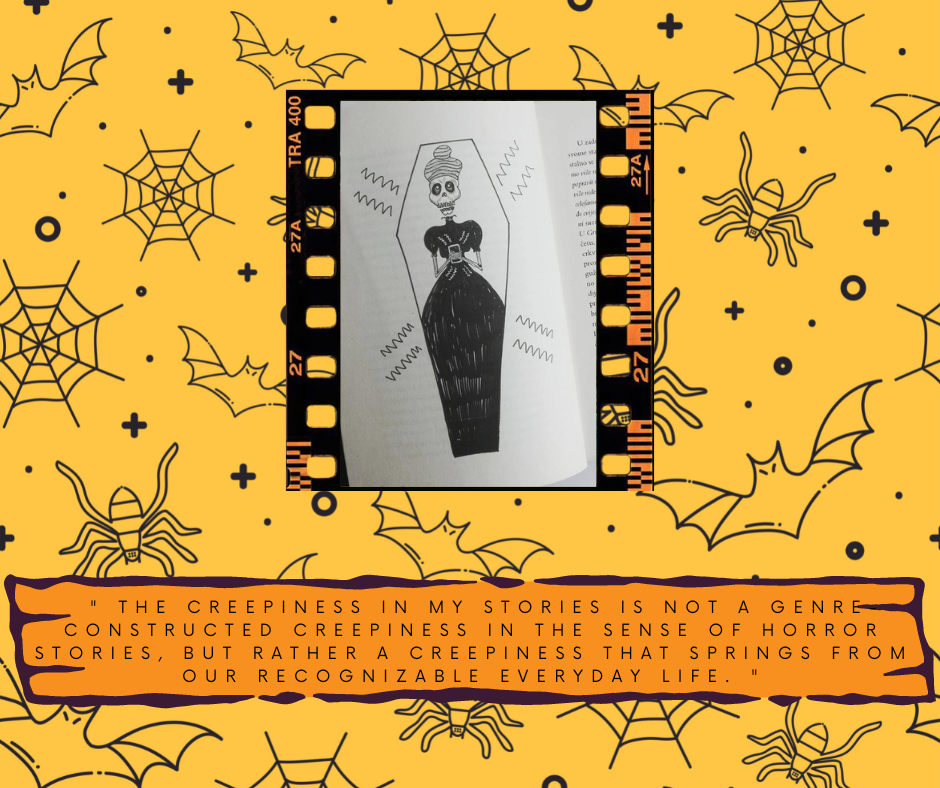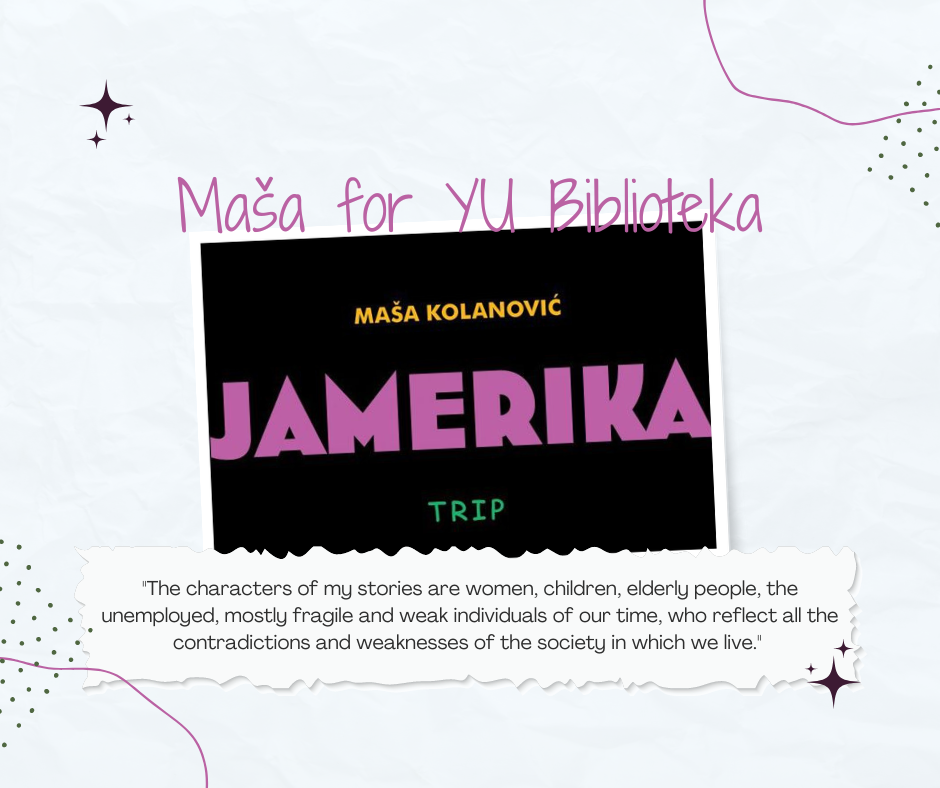“Many topics I write about can be amazed and even critically reconsidered with humor“ – Maša Kolanović, writer

Maša Kolanović, Croatian writer, laureate for the EU prize for literature in 2020 for a collection of stories “Dear Insects and Other Creepy Stories!“, is a professor at the University of Zagreb, Department of Croatian Studies, Faculty of Human and Social Sciences.
So far, she has published a number of authored articles on literature and popular culture, as well as three books of fiction: Leeches for the Lonely (2001), Sloboština Barbie (2008), and Jamerika: Trip (2013). The novel Sloboština Barbie was translated into German in 2012. Her publications include Comparative post-socialism: Slavic experiences, published in 2013, and The Cultural Life of Capitalism in Yugoslavia, published in 2017.
Her collection of stories “Dear Insects and Other Creepy Stories”, published in 2019, was awarded the EU prize for literature in 2020.
- How did the book “Dear Insects and Other Creepy Stories” come about? To what extent were you inspired by Kafka and how do the ideas in his works correspond to today’s world?
Kafka, as a writer with his dark and enigmatic visions, yet very powerful in detecting the sensibility of the time in which he lived, seemed to me close in terms of atmosphere and my own experience of the current reality. Every new epoch and different context activates different potentials of meaning in literary texts. It seems to me that from our current capitalist time, we can find a lot of current, not to say acute, things in Kafka’s texts: the feeling of helplessness, absurdity, and fragility in the relationship between man and the system. In that sense, Kafka is our contemporary. From all that came my motive to conceptually connect my own text with Kafka’s.
From such a twisted perspective, with a certain distance, we can read Kafka’s novel “Metamorphosis~ as an existential metaphor of Man in capitalism, and see what happens to humanity in the capitalist structure of feeling. The main character in Metamorphosis, Gregor Samsa, is a traveling salesman. We read about the reflection on the stress and exhaustion that accompanies his work. At the beginning of the novel, he turns into an insect and becomes completely superfluous to his family. Gregor’s economic uselessness nullifies the meaning of his existence. He becomes passive and does not have the capacity to articulate the word, nor the characters around him who are cruel, and with a lack of empathy. All that fantastic and surreal in Kafka’s novel (written in 1915) does not seem so strange from the perspective of our everyday life.

- What did you want to write about in the book “Dear Insects and Other Creepy Stories”?
I wanted to write about the fragility that a person feels when he finds himself in front of an existential wall, and yet I placed all these situations in our modern capitalist age, with the “folklore” of the consumer society – in its rituals, texts and visual representations that penetrate deep into our intimate life. The characters of my stories are women, children, elderly people, the unemployed, mostly fragile and weak individuals of our time, who reflect all the contradictions and weaknesses of the society in which we live. The stories take place in modern Croatia, and I believe that they will be close to all readers of transition countries as well as to all those who are intrigued by the current global capitalist era.
- What’s creepy about your stories?
The creepiness in my stories is not a genre-constructed creepiness in the sense of horror stories, but rather a creepiness that springs from our recognizable everyday life. This chill is found in very ordinary and everyday situations when viewed from a specific perspective that perceives moments of helplessness, vulnerability, anger, and despair. After all, chills are feeling, that is, a dock effect that can be achieved with different story-building strategies.
- Your stories have a certain kind of humor. What kind of humor is this?
Readers should judge how funny the stories are, I sincerely hope so. For me, humor is certainly an important aspect both in life and in writing, I think that many topics I write about can be amazed and even critically reconsidered with humor.

- For this collection, you received the European Union Prize for Literature in 2020. How significant is this prize to you?
This award, apart from being a nice recognition, has a very specific strategic goal of promoting writers from European Union countries through programs and support for translations into foreign languages. It’s certainly a good way to allow different voices to flow through a larger literary market. On a personal level, it is an opportunity to test how well one’s own text can function and what effect it has beyond the borders of the native culture.
- I would also like to ask you about your previously published book “Jamerika: trip!”. In this book, situated in contemporary America you played with form, and genre, from various angles. One review stated that it was a welcome refreshment on the Croatian literary scene. How did you get the idea for that book?
I wanted to write about the fragility in front of the existential wall that man finds himself in front of. I placed all the situations in our modern capitalist age with a certain “folklore” of the consumer society, its rituals, texts, and visual representations that penetrate deep into our intimate life. The characters of my stories are women, children, elderly people, the unemployed, mostly fragile and weak individuals of our time, who reflect all the contradictions and weaknesses of the society in which we live. The stories take place in contemporary Croatia, and I believe that they will be close to all readers of transition countries as well as to all those who are intrigued by global capitalism “now~.
- In 2020 you stayed for five months at New York University (USA) at the Remarque Institute. Can you tell me more about that experience ?
During my research fellowship at the Remarque Institute at New York University, I studied the literary history of capitalism through the relationship between economics and literature. It is a topic that has occupied me in my research for a long time. New York University offers great opportunities and resources on the subject. What was unexpected was that during my stay, the coronavirus pandemic started, which turned the perception of that city upside down, and the whole experience became a bit surreal. Even under normal circumstances, New York leaves an unreal impression. The pandemic year has further enhanced this in a somewhat frightening way, a dystopian metamorphosis similar to science fiction. But as painful as that change was, anthropologically, culturally, and politically it was indescribably interesting and instructive.

- How do you assess the contemporary Croatian and regional literary scene? Which themes dominate? Which authors would you single out as particularly high-quality and recommend?
Much of the literary output in Croatia is related to the themes of the recent past and to the reflection of current social problems. At the center of the thematic concerns lies the question of changes in identity, gender, class, and ethnicity… In this sense, literature plays an important role in specifically producing “social knowledge”. I believe that its effect, however minor it may be in the relationship with other kinds of discursive mediation of this knowledge, has its own potential which is not negligible. There are many excellent writers from the region, and it is difficult for me to single out my favorites without being unfair to someone. Here are just a few names at the top of my list: Olja Savičević Ivančević, Kristian Novak, Rumena Bužarovska, Barbi Marković, Goran Vojnović, Monika Herceg, Robert Perišić, Miljenko Jergović…
- Are you working on a new manuscript now? What do you have planned?
Currently, I am working on a scientific monograph on America, which has absorbed all my attention and energy, so I set fiction writing aside.
Jelena Jovanović
